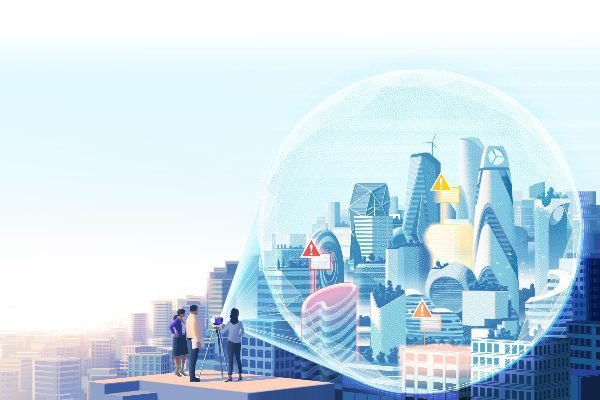De-risking decisions
The idea may have been simple, but the task was not. The Earth’s climate is a highly complex, interconnected system, and building reliable data models that can predict its behaviour has taken decades of painstaking observation and analysis.
To transform petabytes of data into useful insight, Cervest spent five years fusing cutting-edge statistical science, machine learning, Earth science and remote sensing with scalable computing.
The result? The company’s first products: EarthScan™, which quantifies, standardises and rates risk, producing decision-ready insights for any asset, anywhere, and EarthCap™, which feeds Climate Intelligence into financial transactions. This enables businesses, governments and NGOs to explore the impact of climate volatility on their assets, now and in the future – and to act to de-risk their decisions and seize opportunities.
As Iggy says, ‘from design to retirement, we can – for the first time – make climate-intelligent decisions right across an asset’s lifecycle.’
Bridging the climate gap
At the heart of Climate Intelligence is the principle that it must be available, actionable and understandable to anyone.
Climate data – previously complex, fragmented or siloed – has historically been the preserve of those academics trained to understand it, or the few companies interested in (and able to afford) bespoke reports. Cervest transforms that data into dynamic insights that are openly accessible to every person on the planet – from consumers to investors and corporate executives – creating a powerful network effect.
‘Climate Intelligence makes climate risk personalised and actionable – and completely visible – for everyone’, says Iggy. ‘When all stakeholders can see the projected impact of climate change on the same physical assets, there will be more pressure for change’, he points out. ‘And once we can all know what must be done, we can drive change at a transformative pace and on a massive scale.’
Setting the standard
Opening Climate Intelligence to everyone, Iggy believes, is essential not only to catalysing lasting change but, in the immediate term, to complying with imminent regulation. ‘This is the granular level of detail that all companies will need in order to meet the requirements of upcoming mandatory climate risk disclosure rules’, he says.
In May, US President Biden ordered any business working with the federal government to disclose the risks they face from climate change. The UK government, meanwhile, intends the UK to become the first G20 country to make disclosures in line with the Task Force on Climate-related Financial Disclosures (TCFD) mandatory for large private and public companies.
New climate disclosure rules are also coming into force in Switzerland.
Iggy believes meaningful climate disclosure must be standardised. He wants to see an agreed set of metrics, data and reporting frameworks that enable comparisons between different companies, and to build a network of shared climate intelligence. As he succinctly puts it, ‘we must be able to compare apples with apples’.
Businesses are on board; only 6% of businesses surveyed by Cervest were concerned that publicly sharing climate-risk data could have a negative financial impact.
Early movers will reap rewards as assets with lower climate risk are likely to enjoy insurance and financing benefits, while businesses will be able to scrutinise their partners’ exposure – and strengthen their supply chains.
Unsustainable, risky operations can be wound down, vulnerable assets adapted and new opportunities for investment revealed. And consumers will increasingly flock to more resilient providers in an increasingly volatile market.
A strategic window in Glasgow
It’s clear that climate change is not a zero-sum game. According to Iggy, ‘I can’t win if you lose. Our interests in this global economy are too intertwined.’ That shared dynamic can open up interesting opportunities – from investment and financing to new development.
Cervest is advocating at COP26 for open intelligence and standardisation, along with the very real need for a change in how companies think about climate change.
‘The interventions we take today will build resilience tomorrow’, Iggy tells us. ‘The best place to start is at an individual asset level.’ EarthScan helps businesses de-risk decisions for each asset, across multiple scenarios and timeframes – something that hasn’t been achievable until now.
That’s just the start, according to Iggy. ‘Ultimately, our vision is to build a resilient future for everyone on the planet’, he says. ‘Putting climate at the core of every business decision – from financial disclosure to supply chain management – can set us on that path today.’
 Play Video about This Rock Might Just Save The World
Play Video about This Rock Might Just Save The World Play Video about Play 2 hours of rock
Play Video about Play 2 hours of rock Play Video about Play 2 hours of brook
Play Video about Play 2 hours of brook Play Video about Play 2 hours of sheep
Play Video about Play 2 hours of sheep











































